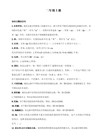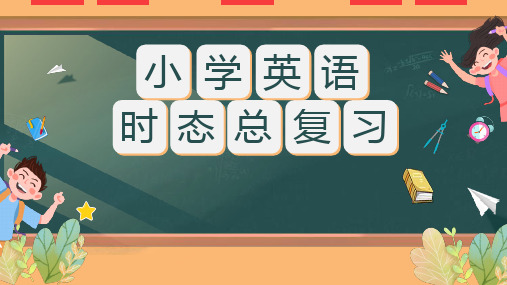六年级英语时态复习PPT课件
合集下载
六年级下册英语-小升初总复习-时态全解-人教版PEP(共29张PPT)

将来时理论
一、 概念:表示将要发生的动作或存在的状态及打算、 计划或准备做某事。 句中一般有以下时间状语: tomorrow, next day(week, month, year…),
soon, the day after tomorrow(后天) this morning , this afternoon , this evening等。
试题演练:
三、 选择正确的答案。 B presents for my parents yesterday. 1. I ____ A. buyed B. bought C. buying C 2. Susan _____ swimming yesterday. A. go B. goes C. went B 3. Danny _____ breakfast five times last week. A. eat B. ate C. eated C Tree Planting Day. 4. Last Sunday____ A. is B. were C. was
试题演练:
一、写出下列动词的过去式或动词原形。 went was 1. go_______ 2. is___________ Lorem ipsum dolor bought 3.buy_______ 5. have had ____
sit amet, consectetur adipisicing elit, sed do eiusmod tempor incididunt ut labore
swam 4.swim__________
6. watched watch _____
eat 7. ate______
get 8. got__________
小学六年级英语小升初现在进行时复习及习题解析课件

write take dance get run swim put
writing taking dancing getting running swimming putting
Exercises:
写出下列词的现在分词:
1.make—— making 2.open———opening
3.clean—— cleaning 4.carry———carrying
C.以“辅音字母+y”结尾变y为i, 再加-es family-families study—studies
D.以“f或fe”结尾变f或fe为v,再加-es knife-knives
E.不规则名词复数man-men woman-women policeman-policemen policewoman-policewomen mouse-mice foot-feet child-children fish-fish Chinese-Chinese
Yes, it is.
No, it isn’t.
What’s she doing? Is she eating rice?
Yes, she is.
No, she isn’t.
What are they doing? Are they watching TV?
What is the bear doing?
Focus on the following sentences.
• (1)I am not reading a book. • (2)He isn’t listening to music. • ( 3 )My mother isn’t sweeping floor. • ( 4 )The dog isn’t running after the cat. • ( 5 ) They aren’t making the bed. • ( 6 ) My sister and I aren’t doing homework. • ( 7) Tom and his sister aren’t playing football.
小学六年级英语语法总复习PPT课件

.
• 小学阶段不规则动词全表
• Infinitive Past tense Infinitive
• 1. am, is
was
2. keep
• 3.are
were
5. make made
4.become
7. blow
blew
8. read
• 9. buy
bought
10. ride
• 11. catch caught
fly-flying walk-walking
jump-jumping sleep-sleeping
climb-climbing fight-fighting
swing-swinging drink-drinking catch-catching pick-picking
watch-watching play-playing
dance danced
变y为 i+ed
study studied
动词的过去式(不规则)
go-went read-read eat-ate sing-sang take-took buy-bought see-saw swim-swam am,is-was do-did are-were have-had get-got leave-left fly-flew stop-stopped(双写)
.
• 一般现在时的变化
1. be动词的变化。
否定句:主语+ be + not +其它。 如:He is not a worker.他不是工人 一般疑问句:Be +主语+其它。 如:-Are you a student? -Yes. I am. / No, I‘m not. 特殊疑问句:疑问词+一般疑问句。如:Where is my bike?
• 小学阶段不规则动词全表
• Infinitive Past tense Infinitive
• 1. am, is
was
2. keep
• 3.are
were
5. make made
4.become
7. blow
blew
8. read
• 9. buy
bought
10. ride
• 11. catch caught
fly-flying walk-walking
jump-jumping sleep-sleeping
climb-climbing fight-fighting
swing-swinging drink-drinking catch-catching pick-picking
watch-watching play-playing
dance danced
变y为 i+ed
study studied
动词的过去式(不规则)
go-went read-read eat-ate sing-sang take-took buy-bought see-saw swim-swam am,is-was do-did are-were have-had get-got leave-left fly-flew stop-stopped(双写)
.
• 一般现在时的变化
1. be动词的变化。
否定句:主语+ be + not +其它。 如:He is not a worker.他不是工人 一般疑问句:Be +主语+其它。 如:-Are you a student? -Yes. I am. / No, I‘m not. 特殊疑问句:疑问词+一般疑问句。如:Where is my bike?
小学六年级下册英语小升初时态课件(通用版) 一般过去时总复习2

4.疑问was/were调句首
• Were you at home the day before yesterday﹖ • Was she happy this morning﹖
肯定回答 Yes, 主语+was/were. 否定回答 No, 主语+wasn't/weren't. Were Xiao Qiang and Xiao Long here just now﹖
• yesterday或以其构成的短语: • yesterday morning • yesterday afternoon • yesterday evening • the day before yesterday
three days ago
Miss Zhu went to Tiantian Market three days ago.
其他家族
Long long ago
yesterday Now
一般过去时 yesterday ago just now in the old days in those days in 1980 the other day at that time once upon a time
一般将来时
现在 进行
• 现在学过的常用的表示过去的时间状语有: just now,a moment ago,yesterday,last week,last night, last weekend,last year,last month,three days ago,two weeks ago,five years ago…
• (3)末尾只有一个元音字母和一个辅音字母的重读闭音节,应 双写末尾的辅音字母,再加-ed,如:stop-stopped, shop-
六年级英语时态综合复习现在进行时课件.ppt

现在进行时
The Present Continuous Tense
现在进行时态表示现在(说话瞬间)正在进行或发生的动作。 标志词:now(现在) look(看) listen(听)等。
现在进行时的基本构成
• 人称+be动词+动词ing形式 注:be动词随人称的变化而变化
Play a game (火眼金睛)
现在进行时的句子形式
第一人称+am+v-ing 第二人称+are+v-ing 第三人称+is+v-ing • 单数+is+v-ing • 复数+are+v-ing
我用am, 你用are, is跟着他,她,它
Fill in the blacks
1.The child ___is__o_p_e_n_in_g___the windows now.(open) 2.The boy ___is_d_r_a_w_i_n_g____ a picture now.(draw) 3.Look! She ___is_r_e_a_d_in_g______ a book.(read) 4.I __a_m__w_r_i_ti_n_g__an e-mail to my friend now.(write) 5.Look!Sarah__i_s_m__a_k_in_g__th_e__b_ed____.(make the bed) 6.Listen!The students__a_r_e_s_i_n_g_in_g_______.(sing) 7.We ____a_re__ru_n_n_i_n_g___ to school now.(run)
现在进行时的句子形式: 主语+be动词+动词的现在分词
小学六年级下册英语小升初时态课件(通用版) 四大时态的综合

2.一般过去时
(1)表示过去某一时间点发生的动作或所处的状态. He arrived in Hangzhou an hour ago.
Where were you just now?
(2)一般过去时往往和明确的过去时间状语连用. yesterday, last night, at that time two days (months, weeks...) ago, in 1996 …
口诀教你学doing
进行时很好记,be加动词-ing; 直接双写去哑e,分词构成须仔细; 别说 be 无词义,主语和它最亲密; 变疑问 be 提前,否定 not 再后添; 何时要用进行时,look,listen,now标记。
The simple past tense • 一般过去时
The simple past tense
walking jumping playing drawing climbing dancing riding diving
v.+ing
sleep stand sweep wash
sleeping clean standing jump sweeping walk washing do
cleaning jumping walking doing
核心知识导图
一般现在时
• 【No. 1】一般现在时的功能 • 1.表示事物或人物的特征、状态。 • The sky is blue.天空是蓝色的。 • 2.表示经常性或习惯性的动作。 • I get up at six every day.我天天六点起床。 • 3.表示客观现实。 • The earth goes around the sun.地球绕着
一般过去时(simple past tense)表示 • 过去某个时间里发生的动作或状态; • 过去习惯性、经常性的动作、行为; • 过去主语所具备的能力和性格。
小升初小学英语四大时态(课件)人教PEP版英语六年级下册

现在进行时
句型:主语+be+动词ing Tom is doing his homework.
第一人称+am+动ing 第二人称+are+动ing 第三人称+is+动ing 口诀:我用am,你用are,is用在他她它,单数名词使 用is ,复数名词使用are 定义:现在进行时表示现在或当前一般时间正在进行 的动作常与Listen,Look,now,Watch out…连用
cleaning
一般将来时
定义:表示将要发生的事或打算、计划、决定要 做的事情。常与tomorrow, tonight, next week/ weekend/ month/ year, this morning/ afternoon/ evening…连用
句型:主语+be going to+动词原形 主语+will+动词原形
现在进行时
动词ing的变化规律: 1)直接加ing ,如: open-opening, clean-
cleaning… 2) 去掉词尾不发音的e ,如:take-taking, come-
coming, have-having, become-becoming … 3) 重读闭音节的,双写最后的字母,加 ing , 如:
last year. 去年李梅总是步行上学。
动词过去式的规则变化
①一般情况,直接加上-ed。如:look-looked。 ②以不发音的字母e结尾的动词,加-d。如:
live-lived。 ③以重读闭音节结尾,先双写辅音字母,再加-
ed。如:stop-stopped
④辅音字母+y结尾的动词,先变y为i,再 加-ed。如:study-studied。
第四章 时态 第1节 一般现在时(课件)通用版英语六年级下册

对应训练
单项选择。
( B )1.My brother ________ a teacher. He ________ his pupils.
A.is;like
B.is;likes
C.are;likes
( A )2.Summer ________ spring.
A.follows
B.followed
知识点4 一般现在时的用法
1.表示经常性或习惯性的动作,常与频度副词(often、usually、 never等)连用。如: Tom usually goes to play tennis after school. 汤姆经常放学后打网球。 2.表示客观存在的真理或科学事实。如: The earth moves around the sun. 地球围绕着太阳转。
4.have _h_a_s____
5.guess _g_u_e_s_se_s_
6.catch _c_a_tc_h_e_s_
7.carry _c_a_rr_i_es__
8.push __p_u_sh_e_s_
9.say ___s_a_y_s_
10.go __g_o_e_s__
11.be ___is____
A.have
B.having
C.are having
( B )3.Don’t be lazy. The early bird ________ the worm.
A.catch
B.catches
C.catching
( B ) 4.My classmate Tom ________ he ________ milk before
小升初英语 总复习课件 (通用版)
第 1 节 一般现在时
六年级英语时态综合复习ppt课件

一般将来时
tomorrow / next day / this afternoon / next week(month year)
一般过去时
yesterday/last week(year month)
8
一般将来时 一般现在时 一般过去时 现在进行时
A always ,usually,often,sometimes, on the weekends,every day
现在进行时( A ) A、动词-ing形式 一般将来时( D ) B、动词过去式 一般过去时( B ) C、动词-s/-es形式 一般现在时(C D ) D、动词原形
5
购物 go shopping
动词过去式 动词-s/-es形式 动词-ing形式 动词原形
went shopping goes shopping
B yesterday,last week,last year
C Look! Listen! now
D tomorrow ,next day, this afternoon,next yis beautiful .we are
going to Hong Zhou__B_ A、last summer holiday B、next summer holiday 2、He climbs mountains_A____ A、every week B、this weekend 3、I am reading a book_A__ A、now B、this evening
at school. 4、They_a_re__g_o_in_g__to__ta_k_e(take)a trip
next week.
12
1、He_i_s_p_la_yi_n_g_____(play)basketball now. 2、They_a_re_g_o_in_g_t_o_p_la_n_t ____(plant) trees next Monday. 3、Hew_a_tc_h_e_s__(watch)TV every evening.His parents_re_a_d_(read) newspapers every day. 4、Our classmates ___c_l_im_b_e_d________(climb) mountains together last weekend.
tomorrow / next day / this afternoon / next week(month year)
一般过去时
yesterday/last week(year month)
8
一般将来时 一般现在时 一般过去时 现在进行时
A always ,usually,often,sometimes, on the weekends,every day
现在进行时( A ) A、动词-ing形式 一般将来时( D ) B、动词过去式 一般过去时( B ) C、动词-s/-es形式 一般现在时(C D ) D、动词原形
5
购物 go shopping
动词过去式 动词-s/-es形式 动词-ing形式 动词原形
went shopping goes shopping
B yesterday,last week,last year
C Look! Listen! now
D tomorrow ,next day, this afternoon,next yis beautiful .we are
going to Hong Zhou__B_ A、last summer holiday B、next summer holiday 2、He climbs mountains_A____ A、every week B、this weekend 3、I am reading a book_A__ A、now B、this evening
at school. 4、They_a_re__g_o_in_g__to__ta_k_e(take)a trip
next week.
12
1、He_i_s_p_la_yi_n_g_____(play)basketball now. 2、They_a_re_g_o_in_g_t_o_p_la_n_t ____(plant) trees next Monday. 3、Hew_a_tc_h_e_s__(watch)TV every evening.His parents_re_a_d_(read) newspapers every day. 4、Our classmates ___c_l_im_b_e_d________(climb) mountains together last weekend.
小学英语时态总复习(课件)度人教版PEP版英语六年级下册

No, I didn’t.
When did you clean the classroom?
yesterday
给对应的时态找到时间伙伴
用动词的正确形式填空 1. she __d_o_e_s_ (do) her homework every evening. 2. We ___f_l_y__ (fly) kites in the park on Sundays. 3. My mother __c_le_a_n_e_d_ (clean) our room last Sunday. 4. Tom __p__la_y_s_(play) the piano every Saturday. Now he_i_s_p_la_y_ing(play). 5. She __l_ik_e_s__(like) swimming. She i_s g_o_in_g_to__sw_im_(swim) next weekend. 6. Usually my mother _w_a_s_h_e_s_ (wash) the dishes after lunch. But my grandma_w_a_s_h_e_d_ (wash) yesterday. 7. Look at the man! He __is_r_e_a_d_i_n_g__ (read) a magazine. 8. _D__id_ (do)you__d_o(do)homework last weekend?
习惯性的 动作
爱好
Tip
经常发生
现在进行时态 表示正在发生的动作, 常与表示现在的时间 now, listen, look 连用
结构:
问:What+be动词+主语+doing? 答:主语+be动词+动词ing形式。 如:——What are you doing?
When did you clean the classroom?
yesterday
给对应的时态找到时间伙伴
用动词的正确形式填空 1. she __d_o_e_s_ (do) her homework every evening. 2. We ___f_l_y__ (fly) kites in the park on Sundays. 3. My mother __c_le_a_n_e_d_ (clean) our room last Sunday. 4. Tom __p__la_y_s_(play) the piano every Saturday. Now he_i_s_p_la_y_ing(play). 5. She __l_ik_e_s__(like) swimming. She i_s g_o_in_g_to__sw_im_(swim) next weekend. 6. Usually my mother _w_a_s_h_e_s_ (wash) the dishes after lunch. But my grandma_w_a_s_h_e_d_ (wash) yesterday. 7. Look at the man! He __is_r_e_a_d_i_n_g__ (read) a magazine. 8. _D__id_ (do)you__d_o(do)homework last weekend?
习惯性的 动作
爱好
Tip
经常发生
现在进行时态 表示正在发生的动作, 常与表示现在的时间 now, listen, look 连用
结构:
问:What+be动词+主语+doing? 答:主语+be动词+动词ing形式。 如:——What are you doing?
小升初必会四大时态(课件)人教PEP版英语六年级下册

2. have __h_a_d__
8. cook __co_o_k_e_d__
3. sleep__s_le_p_t_
9. clean __c_le_a_n_
4. read __r_e_a_d_
10. watch __w_a_tc_h_ed
5. make__m_a_d_e_
11. are __w__er_e_
一般过去时—— Exercises
一、写出下列单词的过去单三形式。
1. go _g_o_e_s
7. clean _cl_e_a_ns__
2. have __h_a_s__
8. walk __w_a_lk_s___
3. do_d_o_e_s__
9. work_w_o_r_k_s_
4.like__li_k_e_s_
3. 无明显时间词,默认为一般现在时
一般过去时—— Grammar
单三有哪些?
①人称代词he, she, it ②指示代词this, that ③人名、地名 ④可数名词单数、不可数
动词单三变化规则:
①一般直接+s ②以s/x/sh/ch/o结尾+es ③以辅音字母+y结尾,变y为i+es ④have变has
动词过去式变化规则:
1. 直接+ed 2. 不发音 e 结尾,直接+d 3. 辅音字母+y 结尾,变 y为 i +ed 4. 双写+ed: trip, plan, stop 5. 不规则变化:课本 P69
一般过去时—— Exercises
一、写出下列单词的过去式。
1. see _s_a_w_
7. wash _w_a_sh_e_d_
人教版(PEP)英语六年级下册一般现在时课件

watch do wash
V三
works lives runs
规则
1.一样情形 -s
watches does washes
2. 以s,x,o,sh,ch 结尾 -es
动词变单三情势
1. 变形规则
2. 肯定句 3. 否定句 4. 一样疑问句 5. 特别疑问句
What’s the rule?
V原
study fly
here, but I am learning to ski. It's really interesting.
Please write to me soon.
Yours, Daniel
(1)Why does Daniel call it white Christmas?
It’s snowy on Christmas.
3.We have English class on Monday. _W__h_e_n_d_o__y_o_u__h_a_v_e_E_n__g_li_sh__c_la__ss_?_________
4.Li Tao usually runs in the park . _W__h_e_r_e_d_o_e_s_L__i _T_a_o_r_u_n__?________________
lunch
do homework
go to bed
get up breakfast go to school have…class lunch do homework go to bed
➢ I go to school on foot everyday.
get up
breakfast
go to school have class lunch
V三
works lives runs
规则
1.一样情形 -s
watches does washes
2. 以s,x,o,sh,ch 结尾 -es
动词变单三情势
1. 变形规则
2. 肯定句 3. 否定句 4. 一样疑问句 5. 特别疑问句
What’s the rule?
V原
study fly
here, but I am learning to ski. It's really interesting.
Please write to me soon.
Yours, Daniel
(1)Why does Daniel call it white Christmas?
It’s snowy on Christmas.
3.We have English class on Monday. _W__h_e_n_d_o__y_o_u__h_a_v_e_E_n__g_li_sh__c_la__ss_?_________
4.Li Tao usually runs in the park . _W__h_e_r_e_d_o_e_s_L__i _T_a_o_r_u_n__?________________
lunch
do homework
go to bed
get up breakfast go to school have…class lunch do homework go to bed
➢ I go to school on foot everyday.
get up
breakfast
go to school have class lunch
小学英语六年级下册专题复习——一般将来时(课件)

Is Piggy going to build a new house?
Yes, he is.
He is going to build a new house.
What is Piggy going to do ?
He is going to build a roof, make a window, build a door, find some food and invite Peggy to his house.
house.
smar
helpful
t
What is Piggy like?
hard-
...
working
Is Peggy going to build a roof?
No, she isn't. She isn't going to build a roof.
Is Peggy going to make a window?
No, she isn't.
She isn't going to make a window.
Is Peggy going to build a door?
No, she isn't.
Sheisn't going tobuild a door.
Is Peggy going to find any food for winter?
When will she build?
Where will she build ?
How will she build?
Piggy and Peggy live in the forest. Piggy is going build a new hsoommutasoekeefionaowtdhiefnodfroowrweinsattnetdor dabanuyd.iliHdinasevdgitooeoiPnr.egTgthgoeynbtohuehilidstiaoshrogouoosifne. .Hget_ois_f__gin_o_di_n_g
六年级下册英语课件-四种时态语法讲解 全国通用版(共张PPT)

以辅元辅结尾的重读闭音节,双 plan→planned
写尾字母,再加-ed
stop→stopped
drop→dropped
结尾是“辅音字母+y”的动词, study→studied
改“y”为“i”再加-ed
worry→worried
cry→cried
2)动词过去式不规则变化要牢记:
• am,is-was are-were do-did see-saw, say-said give-gave get- got go-went come-came have-had, eat-ate take-took, run-ran, sing-sang put-put,
3、基本结构:
• ①be动词(注意be的人称变化,单数用was,复数 用were)
I was in the classroom yesterday morning. He was in the classroom yesterday morning. They were in the classroom yesterday morning.
•
12、越是无能的人,越喜欢挑剔别人 的错儿 。2021/ 8/5202 1/8/520 21/8/5 Thursda y, Au人者有 力,自 胜者强 。2021/ 8/5202 1/8/520 21/8/5 2021/8/ 58/5/2 021
现在分词的变法规律:
• 1、一般在动词词尾加上-ing ,E.g. jump--jumping
• 2、以不发音字母e结尾的动词,先去e,再加-ing. have--having/write--writing/dance-dancing/ take-taking/make-making/come-coming
- 1、下载文档前请自行甄别文档内容的完整性,平台不提供额外的编辑、内容补充、找答案等附加服务。
- 2、"仅部分预览"的文档,不可在线预览部分如存在完整性等问题,可反馈申请退款(可完整预览的文档不适用该条件!)。
- 3、如文档侵犯您的权益,请联系客服反馈,我们会尽快为您处理(人工客服工作时间:9:00-18:30)。
-
15
现在进行时 主语+be+动-ing(现在分词)+其它
一般现在时
①非三单+动词原形+其它 ②三单+动词第三人称单数形式+其它
一般过去时 主语+动词过去式+其它
一般将来时 ①主语+be going to +动词原形+其它 ②主语+ will+动词原形+其它
-
16
一、找—— 时间 二、定—— 根据提示词定时态 三、想—— 所定时态的构成方式
The children ___a_re___ _p_la_y_i_n_g_ _fo_o_t_b_a_ll_ in the
playground.
-
5
Ⅲ. 按要求改写句子。 1. He is playing football in the park. (改为否定句) He _i_s_n_’__t _ _p_la_y_i_n_g_ _fo_o_t_b_a_ll_ in the park. 2. We are talking about them. (改为否定句) We __a_r_e_n_’t_ _t_a_lk_i_n_g_ about them. 3. The fish is swimming. (改为一般疑问句) ___Is____ the fish _s__w__im___m__in__g__?
3. Mike ___h_a__d__(have) a supper with friends last National Day.
4. I__w_i_ll_g_o___ (go) fishing with my sister tomorrow afternoon.
1. 5. The child oftewn a_s_h__e_s____ (wash) his clothes every Sunday.
-
17
Exercise(用所给动词的适当形式填空)
1. Look! The girl __is__ru__n_n_in_g_ (run) in the playground .
现在进行时
主语+be+动-ing(现在分词)
2. He usually ___g_o__e_s__(go) home by bus.
小学英语 时态总结
-
1
定义:表示现在正在发生的事情。 时间状语:now/ Listen!/ Look! 构成方式:主语+be+动-ing(现在分词)+其它
-
2
(1) 直接加-ing (2) 去末尾e,再加-ing, (3) 双写,加-ing
-
3
Ⅰ. 写出下列单词的现在分词。 come __c_o_m__in_g___ dance ___d_an_c_i_n_g__ put __p_u_t_ti_n_g___ collect _c_o_ll_e_c_ti_n_g__ go ___g_o_in_g____ pick___p_i_ck_i_n_g__ take ___ta_k_i_n_g___ swim _s_w_im__m__in_g__
make ___m_a_d_e____ feel ____fe_l_t____
-
13
定义:表示将来发生的动作或情况。 时间状语:tomorrow/ next词组
构成方式:①主语+be going to +动词原形+其
它
②主语+ will+动词原形+其它
-
14
选择填空。
( C )1. We are going to _______ kites.
6. My friends __t_o_o_k___ (take) pictures yesterday.
Ⅰ. 写出下列动词的过去式。
is ____w__a_s___
get ____g_o_t____
are ____w_e_r_e___ see ____sa_w_____
drink __d_r_a_n_k____ have___h_a_d_____
go_____w__e_n_t _ read ___r_e_ad_____
-
6
定义:表示现在的状态,经常的或习惯性的动作。
时间状语: usually/ sometimes/often / always/ every词组/
构成方式:①非三单+动词原形+其它 ②三单+动词单三+其它
-
7
一般现在时的构成
1. 肯定句 (1)主语+am / is / are+表语 They are new students. 他们是新生。 (2)主语+行为动词+其它 I read English every night. 我每天晚上读 英语。
-
4
Ⅱ. 汉译英,每空一词。
1. 我正在看电视。 I ___a_m__ ____w__a__tc__h_i_n_g__TV.
2. 刘涛的父亲正在浇花。
Liu Tao’s father _i_s_____w__a_t_e_r_i_n_g____f_l_o_w__e_r_s___.
3. 孩子们正在操场上踢足球.
A. flies B. flying C. fly
( A)2. I am going to _______ a teacher.
A. be
B. is
C. am
( C )3. – Will you go with us? – Nonot B. willn’t C. won’t
-
8
(1) 多数在动词后加s (2) 以 o,s, x , ch , sh 结尾的动词加 es (3) 以辅音字母加y结尾,把y改i再加es
-
9
Ⅰ. 写出下列动词的第三人称单数形式。 study __s_tu_d_i_e_s___ swim __s_w_i_m_s____ sing __s_i_n_g_s____ fly __f_li_e_s_____ taste ___ta_s_t_e_s___ catch __c_a_t_ch_e_s___
-
10
定义:表示过去某个时间发生的动作 或存在的状态。
时间状语: yesterday / last 词组 / ago
构成方式:主语+动词过去式+其它
-
11
动词过去式规则变化
(1) 直接+ ed (2) 以不发音的e结尾的,+d (3) 辅音字母+y结尾,变y为i加ed (4) 双写,+ed
-
12
